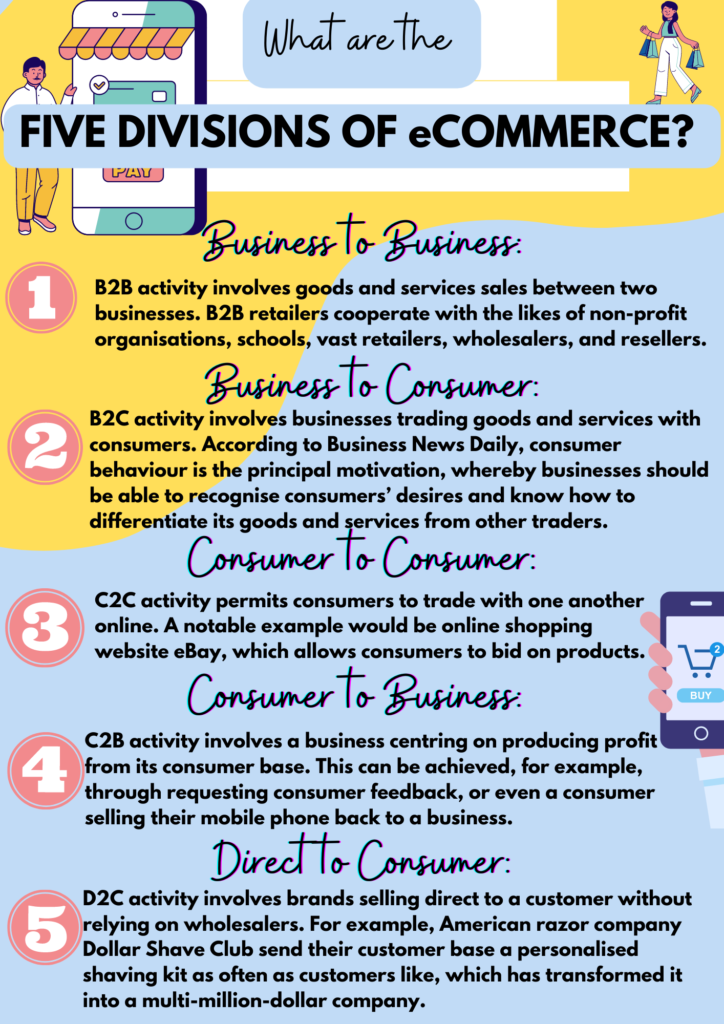eCommerce is fast becoming a vital component of worldwide retail structure. First coined and utilised by the California State Assembly’s Utilities and Commerce Committee’s major consultant Dr Robert Jacobson in 1984, the model has evolved from simple teleshopping services in the 1970s to dominating 36.3 per cent of the of the overall UK retail market. As of 2022, online purchasing is considered more prevalent in the UK than any other leading area of the world, thanks to the Covid-19 pandemic’s influence on consumer trends. But what exactly is eCommerce, and what sort of impact is it really creating?
What is eCommerce and what is its role in a modern environment?
According to commerce expert organisation The Future of Customer Engagement and Experience, eCommerce is a business model, defined as “the buying and selling of goods or services via the Internet, and the transfer of money and data to complete the sales”. Such activity can be achieved through the likes of smartphones, computers, and tablets, and is segmented into five divisions:

How is eCommerce beneficial to retailers?
In an ever-growing digital world, eCommerce hosts a multitude of benefits for retailers. One of the most prominent benefits is the fact that it can support businesses in reaching a wider audience. This is because it can expand availability by eradicating the constraint of open and closing hours: a feature that a physical store would have. Here, physical stores can be limited by the fact that there are lengthy hours throughout the day and night where they are not trading. eCommerce allows consumers to browse from home, where they are not necessarily constrained by set times. An additional strength is that eCommerce provides an infinite consumer reach, and subsequently more visibility, as websites are not bound to a physical location. This allows users from around the world to accessibly locate a business and engage with it when and where they wish.
“eCommerce has been significantly affected by the pandemic,” says Andrew Rogers, owner of Rogers and Rogers eCommerce Consultants in Seaham, County Durham. “But it has actually transformed the way we communicate with clients for the better.
“By acknowledging changing consumer habits in a time when life has been so unprecedented, this allowed us to work closer and enhance our direct communication with clients. This has then allowed us to revaluate clients’ needs and offer even sharper advice and knowledge than ever before.
“It has been a couple of years since the pandemic began, and we have found that such changing consumer habits, whereby online selling rocketed, are set to become an ingrained norm now. This is why eCommerce is so important and is clearly not just a fad.”
Another prominent benefit is that eCommerce can enhance automation. Commerce automation is a system that allows a business to transform manual duties into automatic ones, which simplifies activities like organised sales campaigns through the likes of auto-publishing website content. This is considered a highly time-saving tool that allows businesses to balance the responsibilities of running the internal operations of a business while attracting customers. Moreover, order processing can also be automated so that warehouses can ship products on the same day or the next day.
How do marketing channels drive consumers to eCommerce stores and how can they maximise the likelihood of purchase intent?
eCommerce marketing involves the utilisation of search engines and other digital content to attract traffic to a business’s website and accelerate the likelihood of definitive online purchases. Search engines can be utilised for search engine optimisation, abbreviated to SEO, which aims to enhance a website’s visibility. This then allows more consumers who are searching for a service or product to visit. An effective SEO strategy can be achieved through the likes of analysing existing SEO performance and competitor performance, plus defining important keywords and other activities to enhance the existing performance. Overall, SEO increases the likelihood of ensuring purchase intent as it increases the likelihood of a business’s website appearing within the search engine’s front pages.

Another notable tool is Google Ads. This channel allows advertisers to project the likes of product and service lists, direct advertisements, or videos to consumers. According to SEO Tribunal, Google itself accounts for 90 per cent of the worldwide search engine market, which makes it a crucial space to target consumers. Ultimately, Google Ads allows businesses to bid on keywords or phrases that are then situated somewhere in search pages or even YouTube videos. Again, visibility is enhanced as the tool allows businesses to reach consumers with particular interests, which then targets specific consumers with specific advertisements that are relevant to them. The tool additionally allows businesses to control costs, plus analyse and measure traffic success over time.
Overall, how is eCommerce making an impact in the modern world now more than ever, and is this impact expected to grow?
Economic activity deceleration has accelerated eCommerce growth and digital change since 2020, as the closure of physical spaces during the Covid-19 pandemic saw vast numbers of consumers log online. Although society is now slowly returning to normality, eCommerce is quickly becoming the new normal for many businesses in 2022 as the model is expected to increase its viability by providing record profits. With this in mind, are you willing for it to become your business’s new normal?


